Advanced Accounting Theory: Global Regulation and Integrated Reporting
VerifiedAdded on 2022/07/28
|13
|3155
|33
Report
AI Summary
This report provides an executive summary and detailed discussion of integrated reporting, focusing on its structure, transparency, and stakeholder accountability. It examines the introduction of International Financial Reporting Standards (IFRS) and the arguments both for and against its implementation, highlighting its impact on economic culture, small businesses, and global competition. The report further explores financial regulations, including the role of the International Accounting Standards Board (IASB) and the benefits and drawbacks of regulations for businesses and trade. It also contrasts the Global Accounting Standard Board (GASB) with Australia's regulatory approach. Finally, it offers recommendations for future accounting standards and the integration of environmental performance measures, emphasizing the importance of global integration in accounting and the need for financial regulation to support economic growth and stability. The report concludes with a discussion on the impact of these changes on compliance costs and the importance of financial regulation.
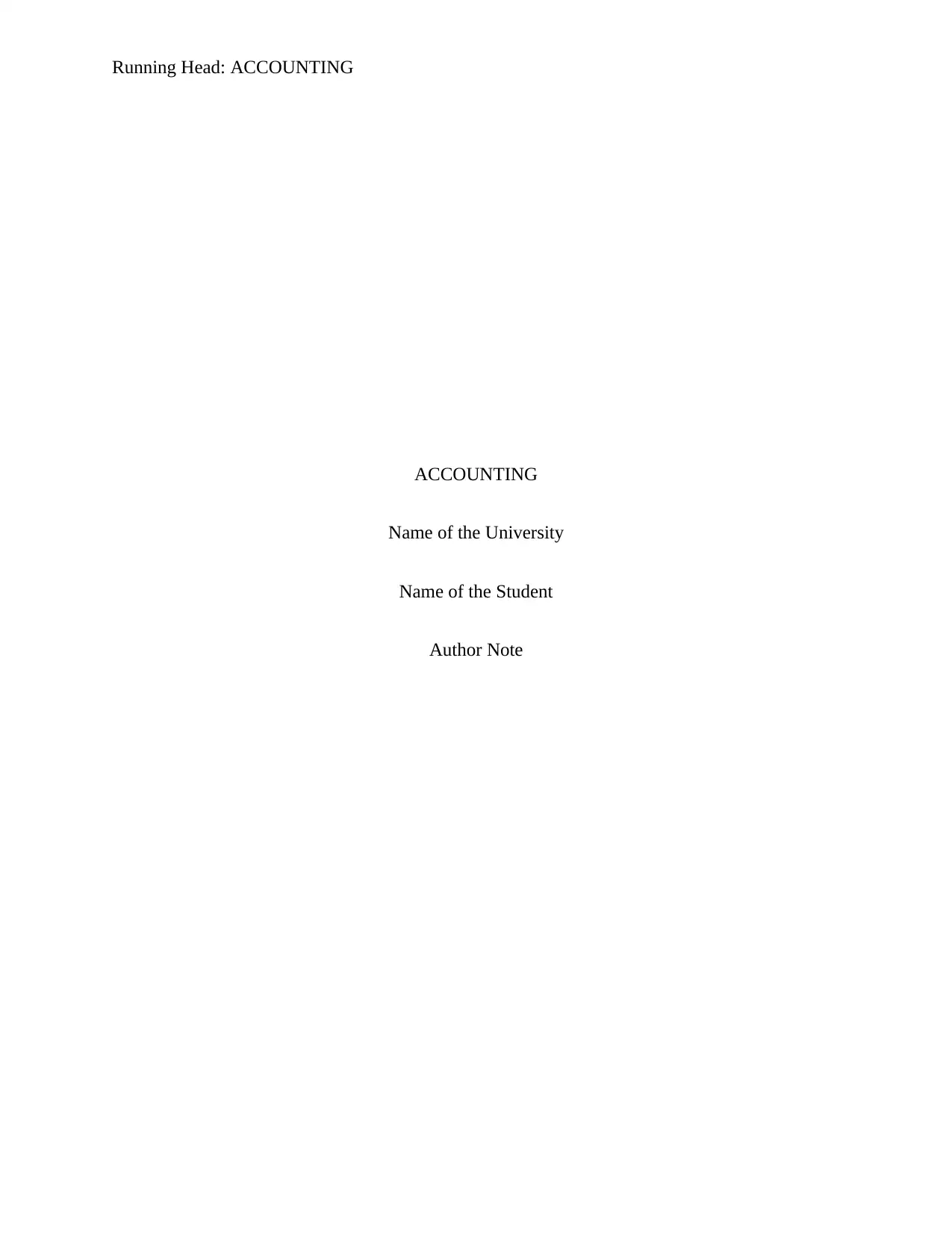
Running Head: ACCOUNTING
ACCOUNTING
Name of the University
Name of the Student
Author Note
ACCOUNTING
Name of the University
Name of the Student
Author Note
Paraphrase This Document
Need a fresh take? Get an instant paraphrase of this document with our AI Paraphraser
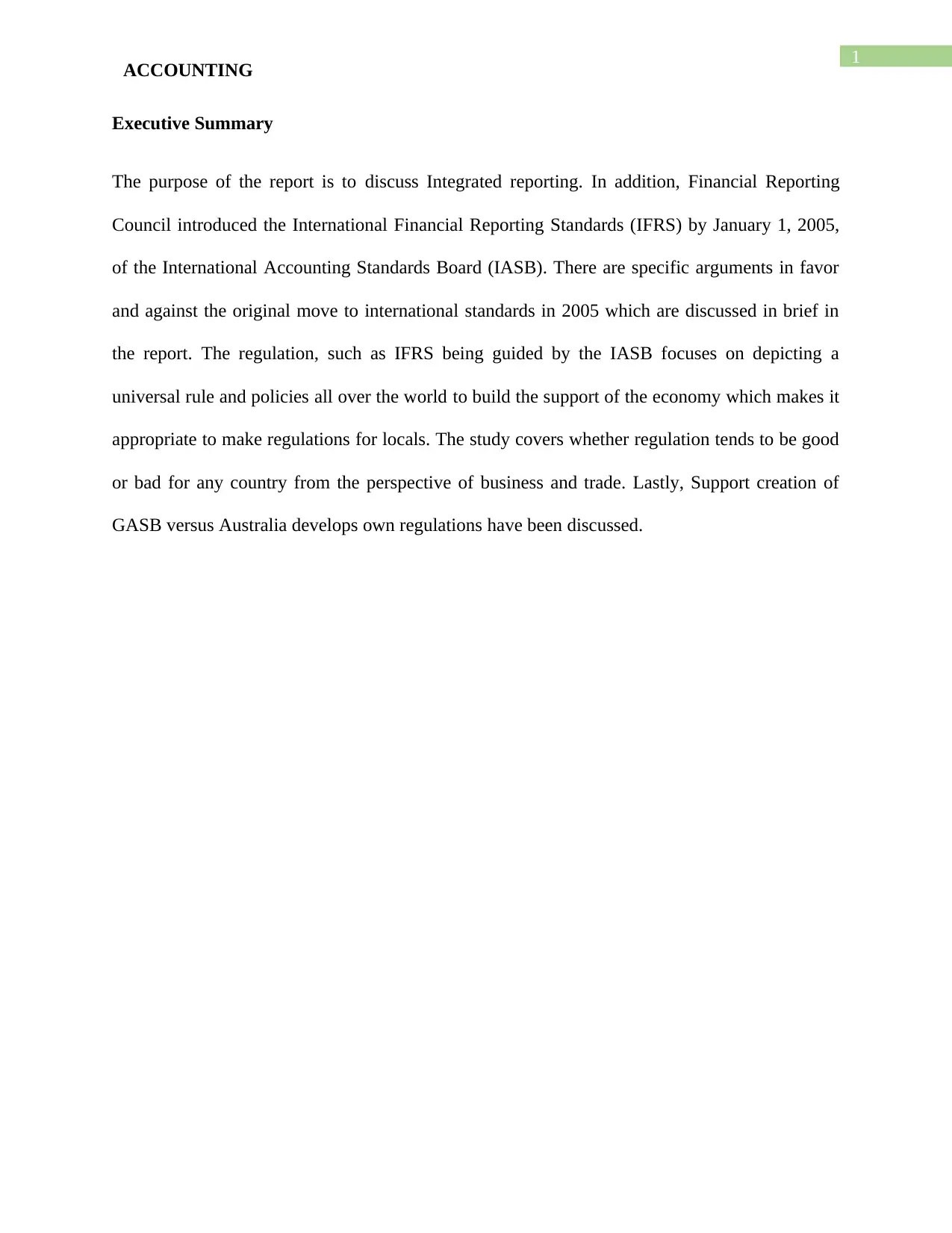
1
ACCOUNTING
Executive Summary
The purpose of the report is to discuss Integrated reporting. In addition, Financial Reporting
Council introduced the International Financial Reporting Standards (IFRS) by January 1, 2005,
of the International Accounting Standards Board (IASB). There are specific arguments in favor
and against the original move to international standards in 2005 which are discussed in brief in
the report. The regulation, such as IFRS being guided by the IASB focuses on depicting a
universal rule and policies all over the world to build the support of the economy which makes it
appropriate to make regulations for locals. The study covers whether regulation tends to be good
or bad for any country from the perspective of business and trade. Lastly, Support creation of
GASB versus Australia develops own regulations have been discussed.
ACCOUNTING
Executive Summary
The purpose of the report is to discuss Integrated reporting. In addition, Financial Reporting
Council introduced the International Financial Reporting Standards (IFRS) by January 1, 2005,
of the International Accounting Standards Board (IASB). There are specific arguments in favor
and against the original move to international standards in 2005 which are discussed in brief in
the report. The regulation, such as IFRS being guided by the IASB focuses on depicting a
universal rule and policies all over the world to build the support of the economy which makes it
appropriate to make regulations for locals. The study covers whether regulation tends to be good
or bad for any country from the perspective of business and trade. Lastly, Support creation of
GASB versus Australia develops own regulations have been discussed.
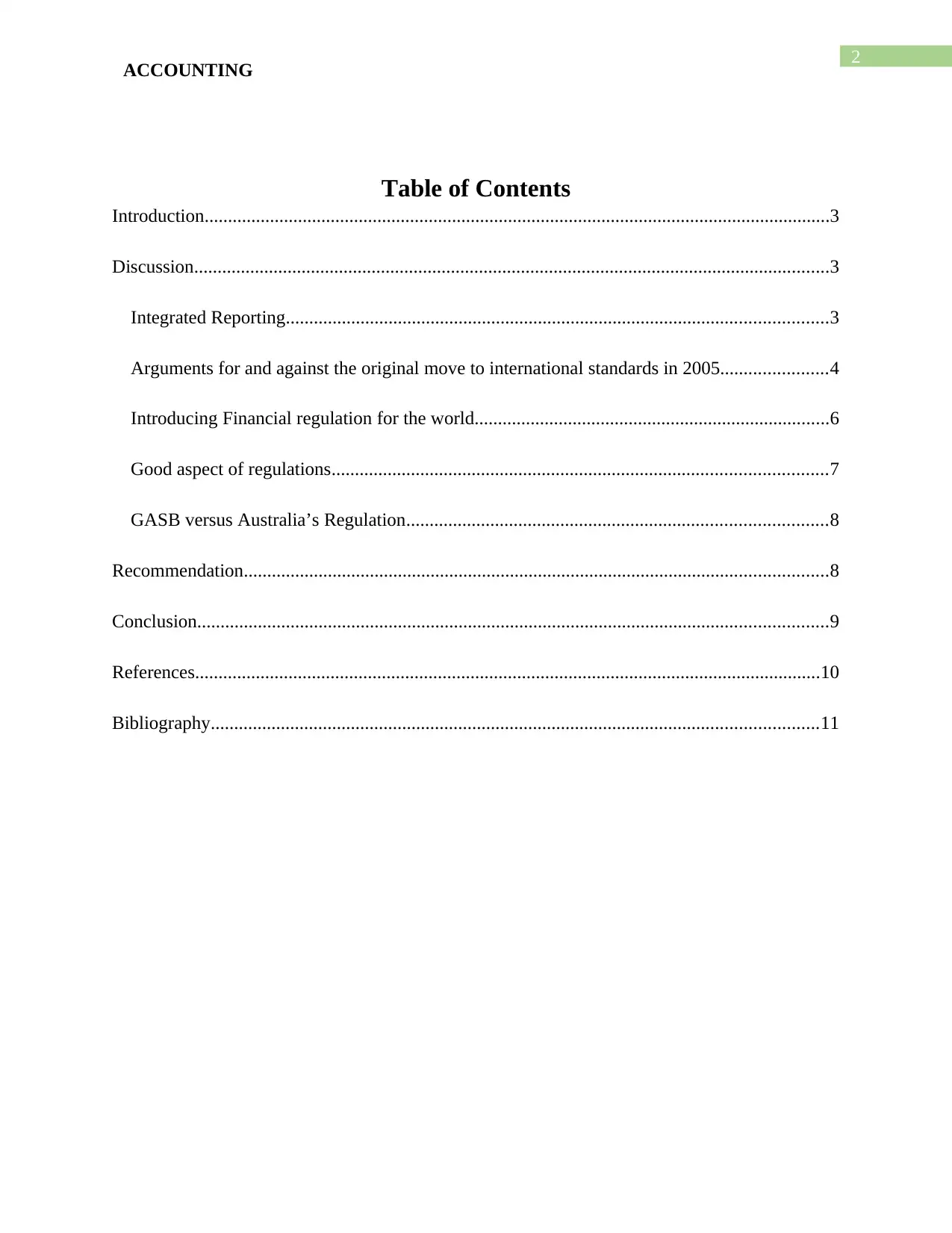
2
ACCOUNTING
Table of Contents
Introduction......................................................................................................................................3
Discussion........................................................................................................................................3
Integrated Reporting....................................................................................................................3
Arguments for and against the original move to international standards in 2005.......................4
Introducing Financial regulation for the world............................................................................6
Good aspect of regulations..........................................................................................................7
GASB versus Australia’s Regulation..........................................................................................8
Recommendation.............................................................................................................................8
Conclusion.......................................................................................................................................9
References......................................................................................................................................10
Bibliography..................................................................................................................................11
ACCOUNTING
Table of Contents
Introduction......................................................................................................................................3
Discussion........................................................................................................................................3
Integrated Reporting....................................................................................................................3
Arguments for and against the original move to international standards in 2005.......................4
Introducing Financial regulation for the world............................................................................6
Good aspect of regulations..........................................................................................................7
GASB versus Australia’s Regulation..........................................................................................8
Recommendation.............................................................................................................................8
Conclusion.......................................................................................................................................9
References......................................................................................................................................10
Bibliography..................................................................................................................................11
⊘ This is a preview!⊘
Do you want full access?
Subscribe today to unlock all pages.

Trusted by 1+ million students worldwide
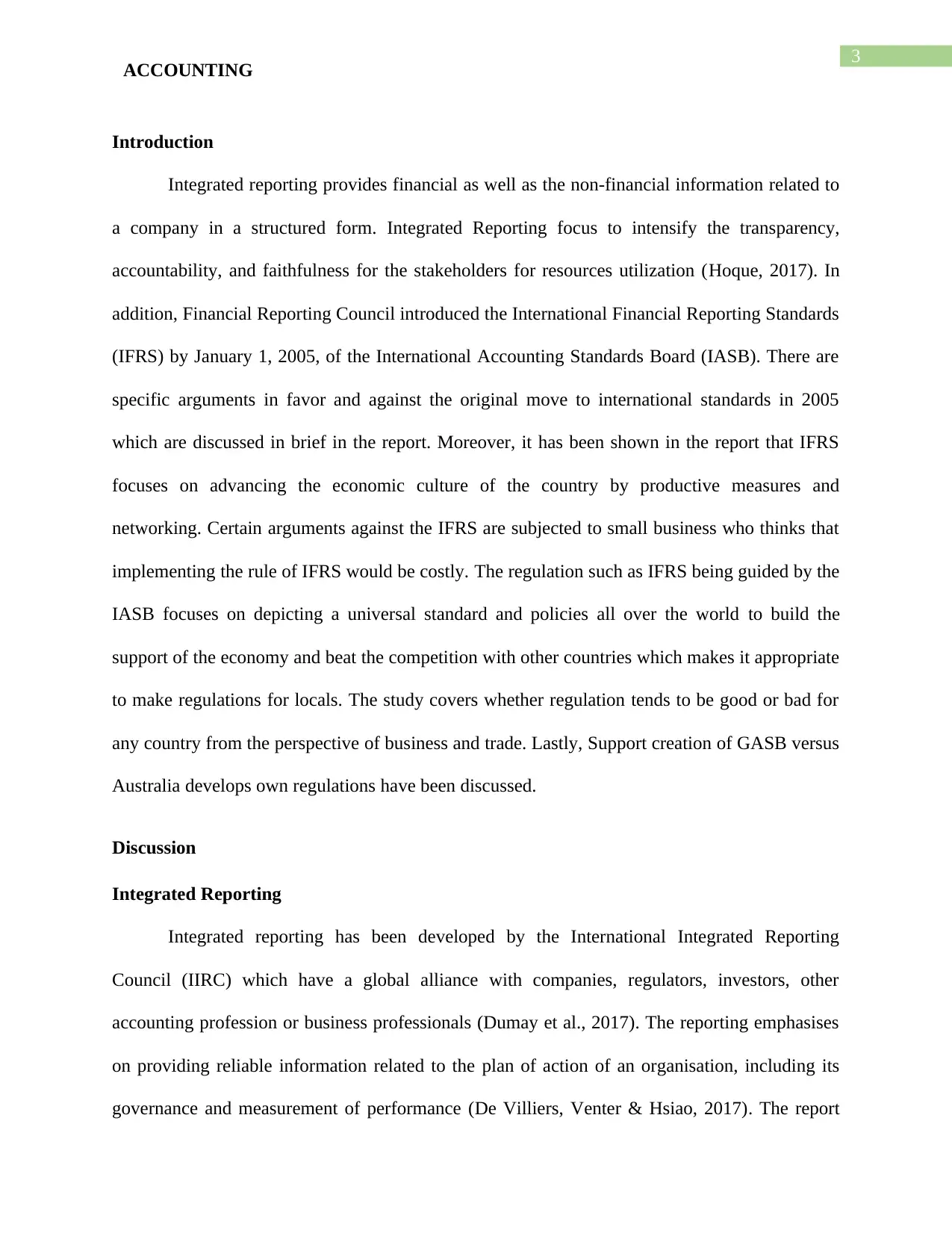
3
ACCOUNTING
Introduction
Integrated reporting provides financial as well as the non-financial information related to
a company in a structured form. Integrated Reporting focus to intensify the transparency,
accountability, and faithfulness for the stakeholders for resources utilization (Hoque, 2017). In
addition, Financial Reporting Council introduced the International Financial Reporting Standards
(IFRS) by January 1, 2005, of the International Accounting Standards Board (IASB). There are
specific arguments in favor and against the original move to international standards in 2005
which are discussed in brief in the report. Moreover, it has been shown in the report that IFRS
focuses on advancing the economic culture of the country by productive measures and
networking. Certain arguments against the IFRS are subjected to small business who thinks that
implementing the rule of IFRS would be costly. The regulation such as IFRS being guided by the
IASB focuses on depicting a universal standard and policies all over the world to build the
support of the economy and beat the competition with other countries which makes it appropriate
to make regulations for locals. The study covers whether regulation tends to be good or bad for
any country from the perspective of business and trade. Lastly, Support creation of GASB versus
Australia develops own regulations have been discussed.
Discussion
Integrated Reporting
Integrated reporting has been developed by the International Integrated Reporting
Council (IIRC) which have a global alliance with companies, regulators, investors, other
accounting profession or business professionals (Dumay et al., 2017). The reporting emphasises
on providing reliable information related to the plan of action of an organisation, including its
governance and measurement of performance (De Villiers, Venter & Hsiao, 2017). The report
ACCOUNTING
Introduction
Integrated reporting provides financial as well as the non-financial information related to
a company in a structured form. Integrated Reporting focus to intensify the transparency,
accountability, and faithfulness for the stakeholders for resources utilization (Hoque, 2017). In
addition, Financial Reporting Council introduced the International Financial Reporting Standards
(IFRS) by January 1, 2005, of the International Accounting Standards Board (IASB). There are
specific arguments in favor and against the original move to international standards in 2005
which are discussed in brief in the report. Moreover, it has been shown in the report that IFRS
focuses on advancing the economic culture of the country by productive measures and
networking. Certain arguments against the IFRS are subjected to small business who thinks that
implementing the rule of IFRS would be costly. The regulation such as IFRS being guided by the
IASB focuses on depicting a universal standard and policies all over the world to build the
support of the economy and beat the competition with other countries which makes it appropriate
to make regulations for locals. The study covers whether regulation tends to be good or bad for
any country from the perspective of business and trade. Lastly, Support creation of GASB versus
Australia develops own regulations have been discussed.
Discussion
Integrated Reporting
Integrated reporting has been developed by the International Integrated Reporting
Council (IIRC) which have a global alliance with companies, regulators, investors, other
accounting profession or business professionals (Dumay et al., 2017). The reporting emphasises
on providing reliable information related to the plan of action of an organisation, including its
governance and measurement of performance (De Villiers, Venter & Hsiao, 2017). The report
Paraphrase This Document
Need a fresh take? Get an instant paraphrase of this document with our AI Paraphraser
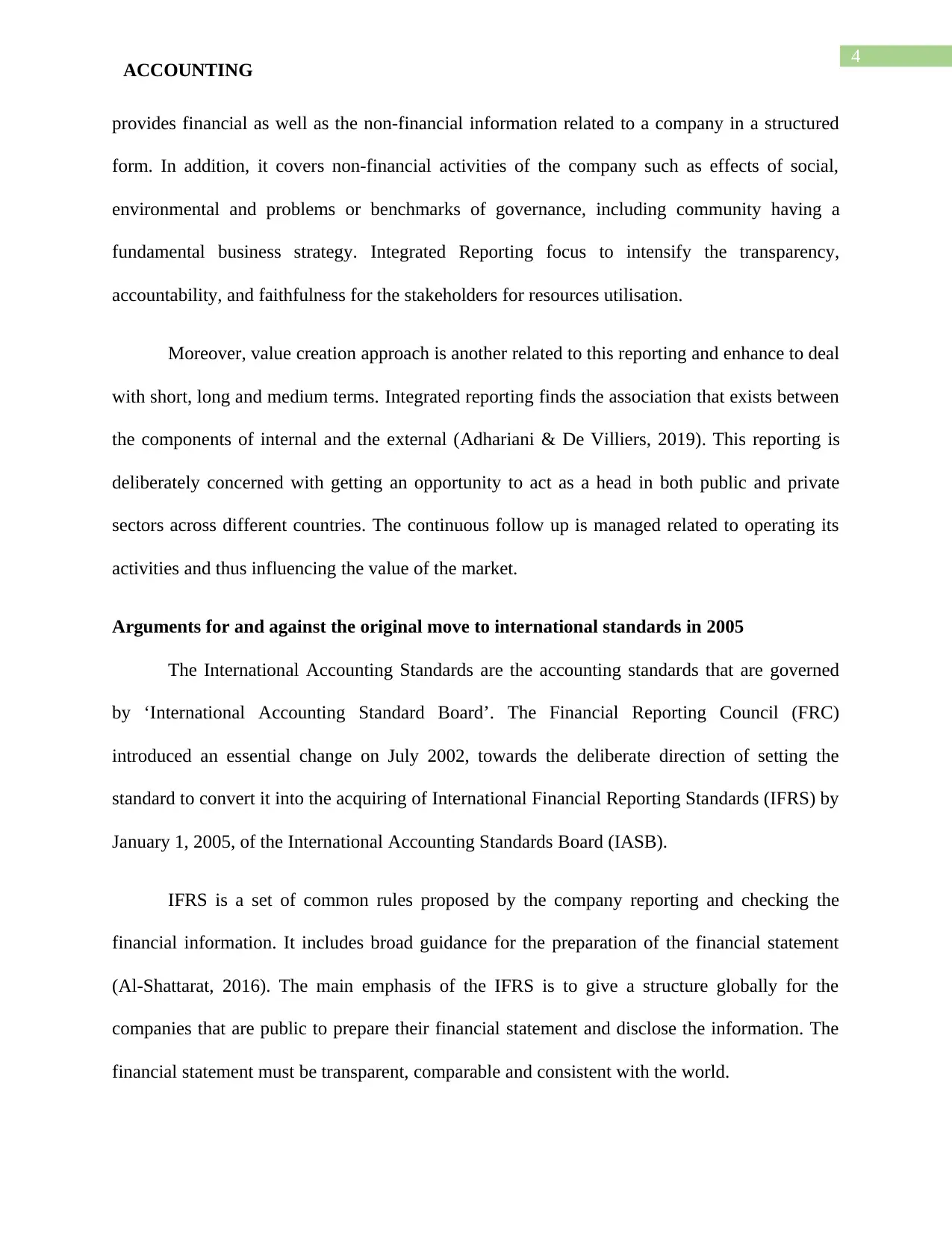
4
ACCOUNTING
provides financial as well as the non-financial information related to a company in a structured
form. In addition, it covers non-financial activities of the company such as effects of social,
environmental and problems or benchmarks of governance, including community having a
fundamental business strategy. Integrated Reporting focus to intensify the transparency,
accountability, and faithfulness for the stakeholders for resources utilisation.
Moreover, value creation approach is another related to this reporting and enhance to deal
with short, long and medium terms. Integrated reporting finds the association that exists between
the components of internal and the external (Adhariani & De Villiers, 2019). This reporting is
deliberately concerned with getting an opportunity to act as a head in both public and private
sectors across different countries. The continuous follow up is managed related to operating its
activities and thus influencing the value of the market.
Arguments for and against the original move to international standards in 2005
The International Accounting Standards are the accounting standards that are governed
by ‘International Accounting Standard Board’. The Financial Reporting Council (FRC)
introduced an essential change on July 2002, towards the deliberate direction of setting the
standard to convert it into the acquiring of International Financial Reporting Standards (IFRS) by
January 1, 2005, of the International Accounting Standards Board (IASB).
IFRS is a set of common rules proposed by the company reporting and checking the
financial information. It includes broad guidance for the preparation of the financial statement
(Al-Shattarat, 2016). The main emphasis of the IFRS is to give a structure globally for the
companies that are public to prepare their financial statement and disclose the information. The
financial statement must be transparent, comparable and consistent with the world.
ACCOUNTING
provides financial as well as the non-financial information related to a company in a structured
form. In addition, it covers non-financial activities of the company such as effects of social,
environmental and problems or benchmarks of governance, including community having a
fundamental business strategy. Integrated Reporting focus to intensify the transparency,
accountability, and faithfulness for the stakeholders for resources utilisation.
Moreover, value creation approach is another related to this reporting and enhance to deal
with short, long and medium terms. Integrated reporting finds the association that exists between
the components of internal and the external (Adhariani & De Villiers, 2019). This reporting is
deliberately concerned with getting an opportunity to act as a head in both public and private
sectors across different countries. The continuous follow up is managed related to operating its
activities and thus influencing the value of the market.
Arguments for and against the original move to international standards in 2005
The International Accounting Standards are the accounting standards that are governed
by ‘International Accounting Standard Board’. The Financial Reporting Council (FRC)
introduced an essential change on July 2002, towards the deliberate direction of setting the
standard to convert it into the acquiring of International Financial Reporting Standards (IFRS) by
January 1, 2005, of the International Accounting Standards Board (IASB).
IFRS is a set of common rules proposed by the company reporting and checking the
financial information. It includes broad guidance for the preparation of the financial statement
(Al-Shattarat, 2016). The main emphasis of the IFRS is to give a structure globally for the
companies that are public to prepare their financial statement and disclose the information. The
financial statement must be transparent, comparable and consistent with the world.
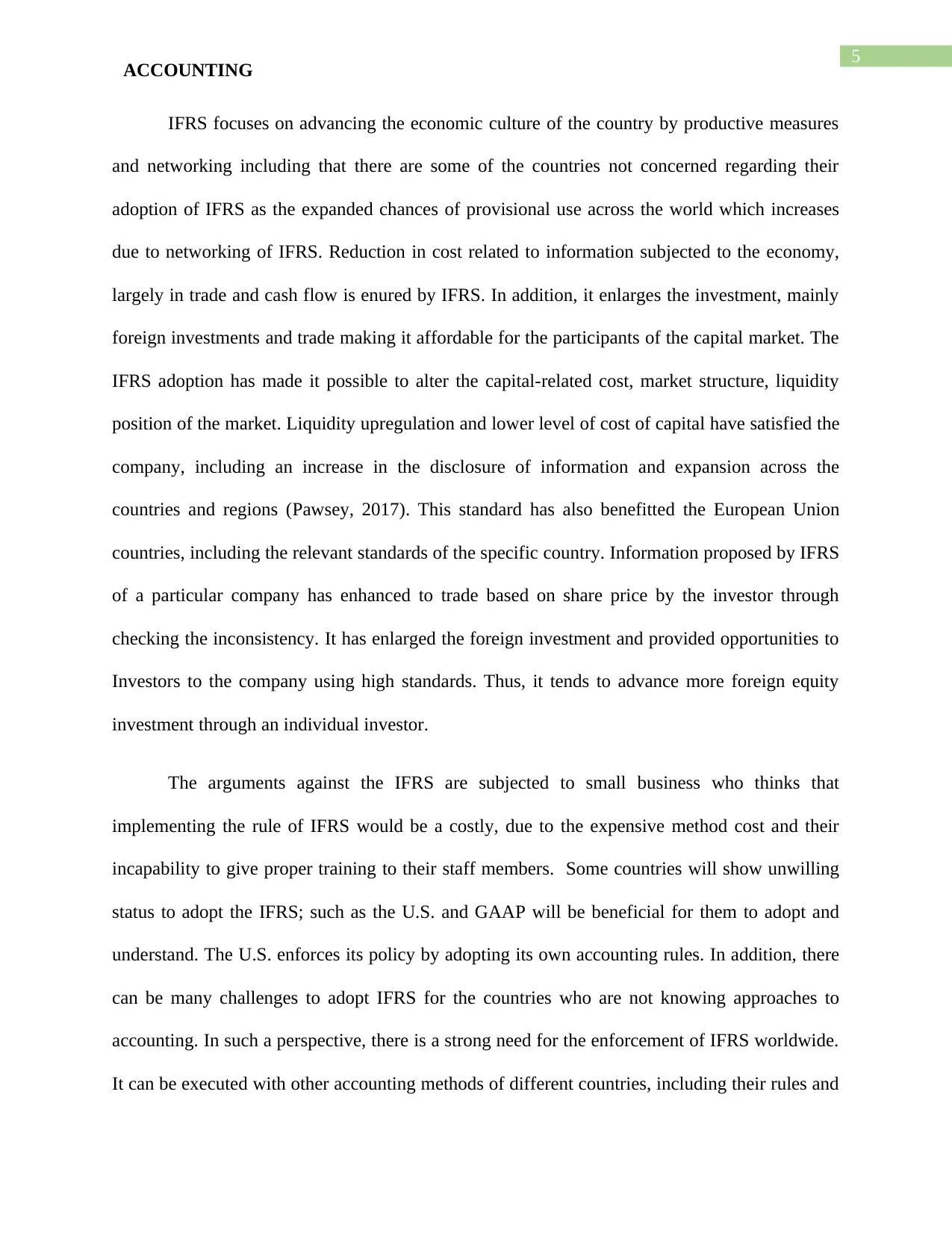
5
ACCOUNTING
IFRS focuses on advancing the economic culture of the country by productive measures
and networking including that there are some of the countries not concerned regarding their
adoption of IFRS as the expanded chances of provisional use across the world which increases
due to networking of IFRS. Reduction in cost related to information subjected to the economy,
largely in trade and cash flow is enured by IFRS. In addition, it enlarges the investment, mainly
foreign investments and trade making it affordable for the participants of the capital market. The
IFRS adoption has made it possible to alter the capital-related cost, market structure, liquidity
position of the market. Liquidity upregulation and lower level of cost of capital have satisfied the
company, including an increase in the disclosure of information and expansion across the
countries and regions (Pawsey, 2017). This standard has also benefitted the European Union
countries, including the relevant standards of the specific country. Information proposed by IFRS
of a particular company has enhanced to trade based on share price by the investor through
checking the inconsistency. It has enlarged the foreign investment and provided opportunities to
Investors to the company using high standards. Thus, it tends to advance more foreign equity
investment through an individual investor.
The arguments against the IFRS are subjected to small business who thinks that
implementing the rule of IFRS would be a costly, due to the expensive method cost and their
incapability to give proper training to their staff members. Some countries will show unwilling
status to adopt the IFRS; such as the U.S. and GAAP will be beneficial for them to adopt and
understand. The U.S. enforces its policy by adopting its own accounting rules. In addition, there
can be many challenges to adopt IFRS for the countries who are not knowing approaches to
accounting. In such a perspective, there is a strong need for the enforcement of IFRS worldwide.
It can be executed with other accounting methods of different countries, including their rules and
ACCOUNTING
IFRS focuses on advancing the economic culture of the country by productive measures
and networking including that there are some of the countries not concerned regarding their
adoption of IFRS as the expanded chances of provisional use across the world which increases
due to networking of IFRS. Reduction in cost related to information subjected to the economy,
largely in trade and cash flow is enured by IFRS. In addition, it enlarges the investment, mainly
foreign investments and trade making it affordable for the participants of the capital market. The
IFRS adoption has made it possible to alter the capital-related cost, market structure, liquidity
position of the market. Liquidity upregulation and lower level of cost of capital have satisfied the
company, including an increase in the disclosure of information and expansion across the
countries and regions (Pawsey, 2017). This standard has also benefitted the European Union
countries, including the relevant standards of the specific country. Information proposed by IFRS
of a particular company has enhanced to trade based on share price by the investor through
checking the inconsistency. It has enlarged the foreign investment and provided opportunities to
Investors to the company using high standards. Thus, it tends to advance more foreign equity
investment through an individual investor.
The arguments against the IFRS are subjected to small business who thinks that
implementing the rule of IFRS would be a costly, due to the expensive method cost and their
incapability to give proper training to their staff members. Some countries will show unwilling
status to adopt the IFRS; such as the U.S. and GAAP will be beneficial for them to adopt and
understand. The U.S. enforces its policy by adopting its own accounting rules. In addition, there
can be many challenges to adopt IFRS for the countries who are not knowing approaches to
accounting. In such a perspective, there is a strong need for the enforcement of IFRS worldwide.
It can be executed with other accounting methods of different countries, including their rules and
⊘ This is a preview!⊘
Do you want full access?
Subscribe today to unlock all pages.

Trusted by 1+ million students worldwide
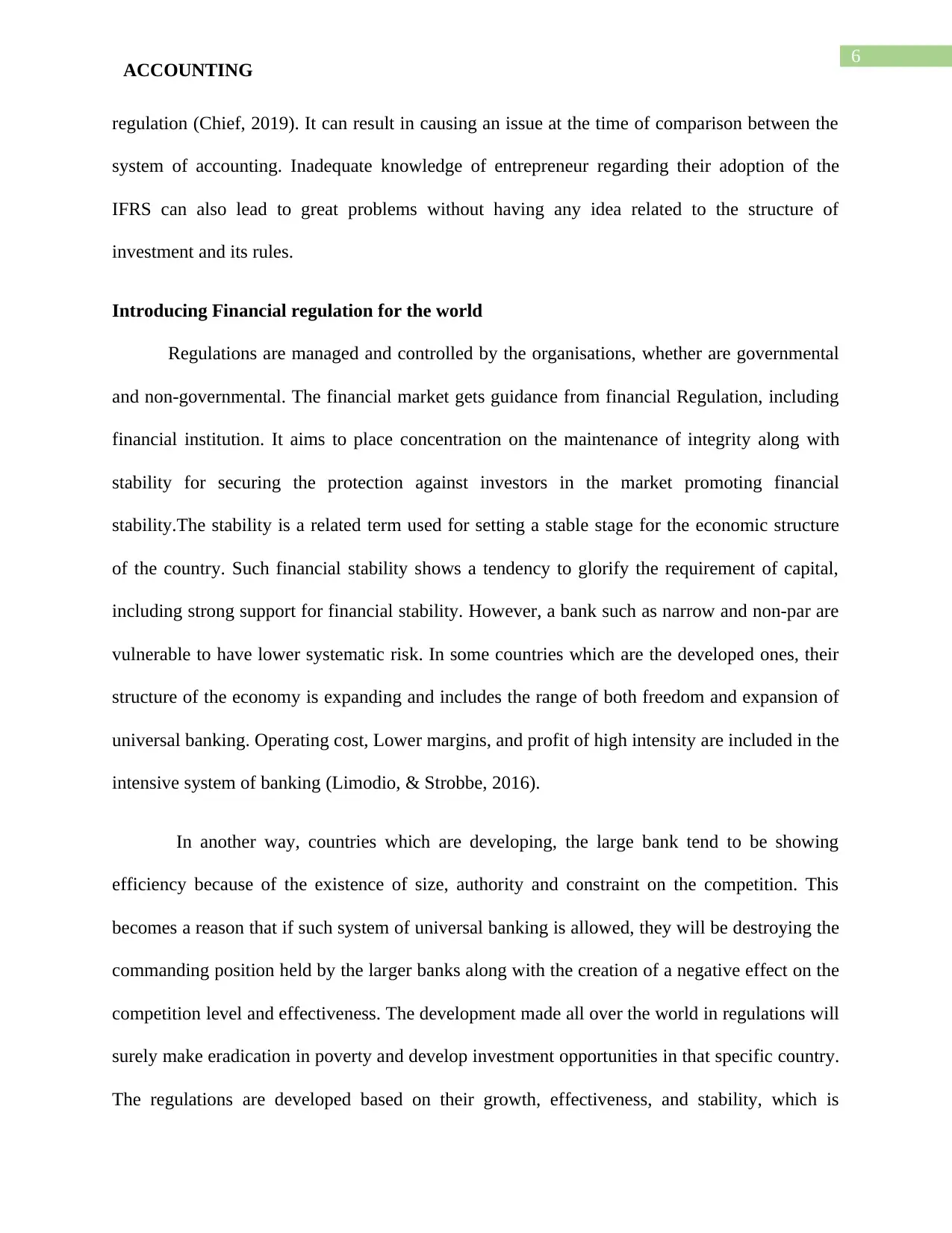
6
ACCOUNTING
regulation (Chief, 2019). It can result in causing an issue at the time of comparison between the
system of accounting. Inadequate knowledge of entrepreneur regarding their adoption of the
IFRS can also lead to great problems without having any idea related to the structure of
investment and its rules.
Introducing Financial regulation for the world
Regulations are managed and controlled by the organisations, whether are governmental
and non-governmental. The financial market gets guidance from financial Regulation, including
financial institution. It aims to place concentration on the maintenance of integrity along with
stability for securing the protection against investors in the market promoting financial
stability.The stability is a related term used for setting a stable stage for the economic structure
of the country. Such financial stability shows a tendency to glorify the requirement of capital,
including strong support for financial stability. However, a bank such as narrow and non-par are
vulnerable to have lower systematic risk. In some countries which are the developed ones, their
structure of the economy is expanding and includes the range of both freedom and expansion of
universal banking. Operating cost, Lower margins, and profit of high intensity are included in the
intensive system of banking (Limodio, & Strobbe, 2016).
In another way, countries which are developing, the large bank tend to be showing
efficiency because of the existence of size, authority and constraint on the competition. This
becomes a reason that if such system of universal banking is allowed, they will be destroying the
commanding position held by the larger banks along with the creation of a negative effect on the
competition level and effectiveness. The development made all over the world in regulations will
surely make eradication in poverty and develop investment opportunities in that specific country.
The regulations are developed based on their growth, effectiveness, and stability, which is
ACCOUNTING
regulation (Chief, 2019). It can result in causing an issue at the time of comparison between the
system of accounting. Inadequate knowledge of entrepreneur regarding their adoption of the
IFRS can also lead to great problems without having any idea related to the structure of
investment and its rules.
Introducing Financial regulation for the world
Regulations are managed and controlled by the organisations, whether are governmental
and non-governmental. The financial market gets guidance from financial Regulation, including
financial institution. It aims to place concentration on the maintenance of integrity along with
stability for securing the protection against investors in the market promoting financial
stability.The stability is a related term used for setting a stable stage for the economic structure
of the country. Such financial stability shows a tendency to glorify the requirement of capital,
including strong support for financial stability. However, a bank such as narrow and non-par are
vulnerable to have lower systematic risk. In some countries which are the developed ones, their
structure of the economy is expanding and includes the range of both freedom and expansion of
universal banking. Operating cost, Lower margins, and profit of high intensity are included in the
intensive system of banking (Limodio, & Strobbe, 2016).
In another way, countries which are developing, the large bank tend to be showing
efficiency because of the existence of size, authority and constraint on the competition. This
becomes a reason that if such system of universal banking is allowed, they will be destroying the
commanding position held by the larger banks along with the creation of a negative effect on the
competition level and effectiveness. The development made all over the world in regulations will
surely make eradication in poverty and develop investment opportunities in that specific country.
The regulations are developed based on their growth, effectiveness, and stability, which is
Paraphrase This Document
Need a fresh take? Get an instant paraphrase of this document with our AI Paraphraser
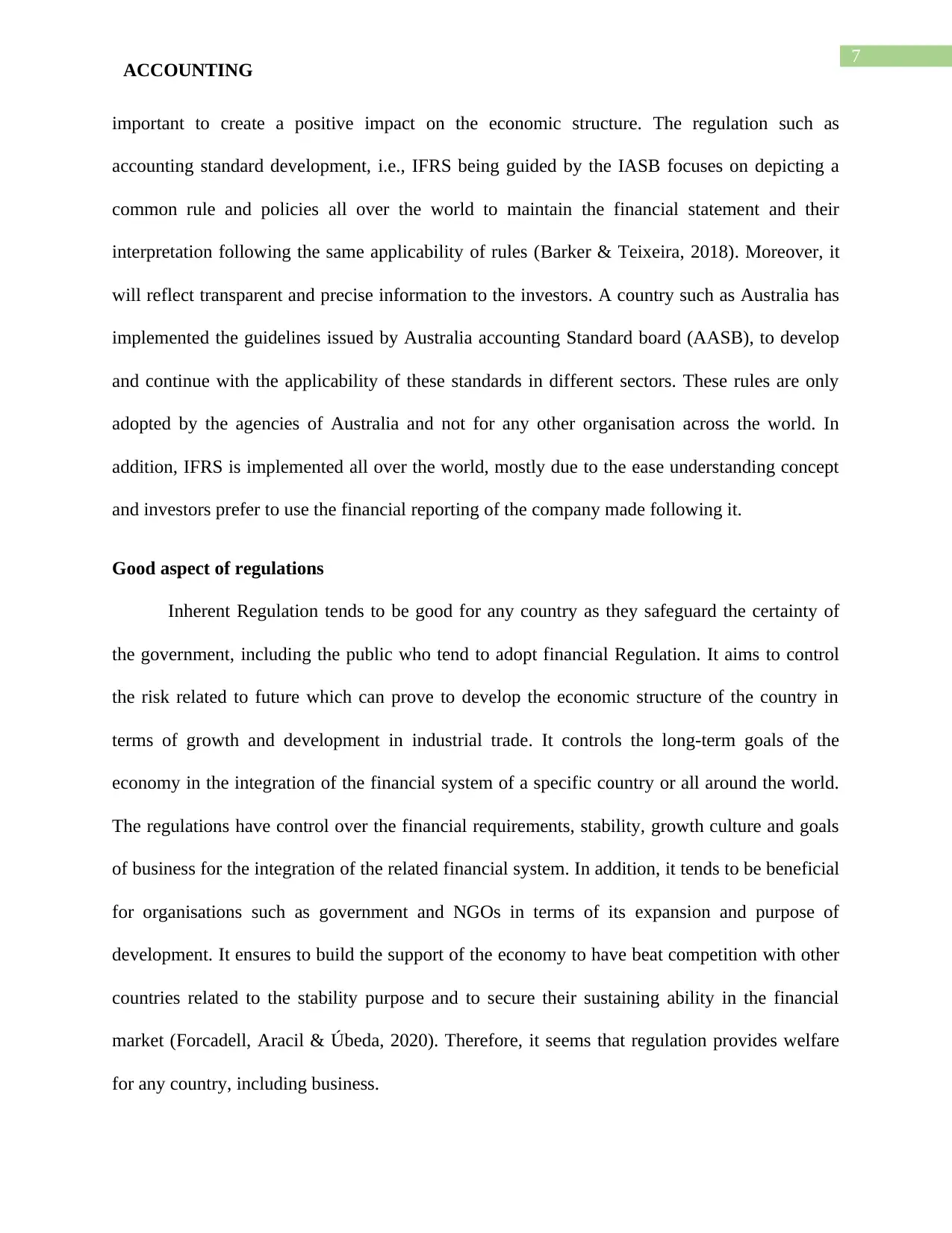
7
ACCOUNTING
important to create a positive impact on the economic structure. The regulation such as
accounting standard development, i.e., IFRS being guided by the IASB focuses on depicting a
common rule and policies all over the world to maintain the financial statement and their
interpretation following the same applicability of rules (Barker & Teixeira, 2018). Moreover, it
will reflect transparent and precise information to the investors. A country such as Australia has
implemented the guidelines issued by Australia accounting Standard board (AASB), to develop
and continue with the applicability of these standards in different sectors. These rules are only
adopted by the agencies of Australia and not for any other organisation across the world. In
addition, IFRS is implemented all over the world, mostly due to the ease understanding concept
and investors prefer to use the financial reporting of the company made following it.
Good aspect of regulations
Inherent Regulation tends to be good for any country as they safeguard the certainty of
the government, including the public who tend to adopt financial Regulation. It aims to control
the risk related to future which can prove to develop the economic structure of the country in
terms of growth and development in industrial trade. It controls the long-term goals of the
economy in the integration of the financial system of a specific country or all around the world.
The regulations have control over the financial requirements, stability, growth culture and goals
of business for the integration of the related financial system. In addition, it tends to be beneficial
for organisations such as government and NGOs in terms of its expansion and purpose of
development. It ensures to build the support of the economy to have beat competition with other
countries related to the stability purpose and to secure their sustaining ability in the financial
market (Forcadell, Aracil & Úbeda, 2020). Therefore, it seems that regulation provides welfare
for any country, including business.
ACCOUNTING
important to create a positive impact on the economic structure. The regulation such as
accounting standard development, i.e., IFRS being guided by the IASB focuses on depicting a
common rule and policies all over the world to maintain the financial statement and their
interpretation following the same applicability of rules (Barker & Teixeira, 2018). Moreover, it
will reflect transparent and precise information to the investors. A country such as Australia has
implemented the guidelines issued by Australia accounting Standard board (AASB), to develop
and continue with the applicability of these standards in different sectors. These rules are only
adopted by the agencies of Australia and not for any other organisation across the world. In
addition, IFRS is implemented all over the world, mostly due to the ease understanding concept
and investors prefer to use the financial reporting of the company made following it.
Good aspect of regulations
Inherent Regulation tends to be good for any country as they safeguard the certainty of
the government, including the public who tend to adopt financial Regulation. It aims to control
the risk related to future which can prove to develop the economic structure of the country in
terms of growth and development in industrial trade. It controls the long-term goals of the
economy in the integration of the financial system of a specific country or all around the world.
The regulations have control over the financial requirements, stability, growth culture and goals
of business for the integration of the related financial system. In addition, it tends to be beneficial
for organisations such as government and NGOs in terms of its expansion and purpose of
development. It ensures to build the support of the economy to have beat competition with other
countries related to the stability purpose and to secure their sustaining ability in the financial
market (Forcadell, Aracil & Úbeda, 2020). Therefore, it seems that regulation provides welfare
for any country, including business.
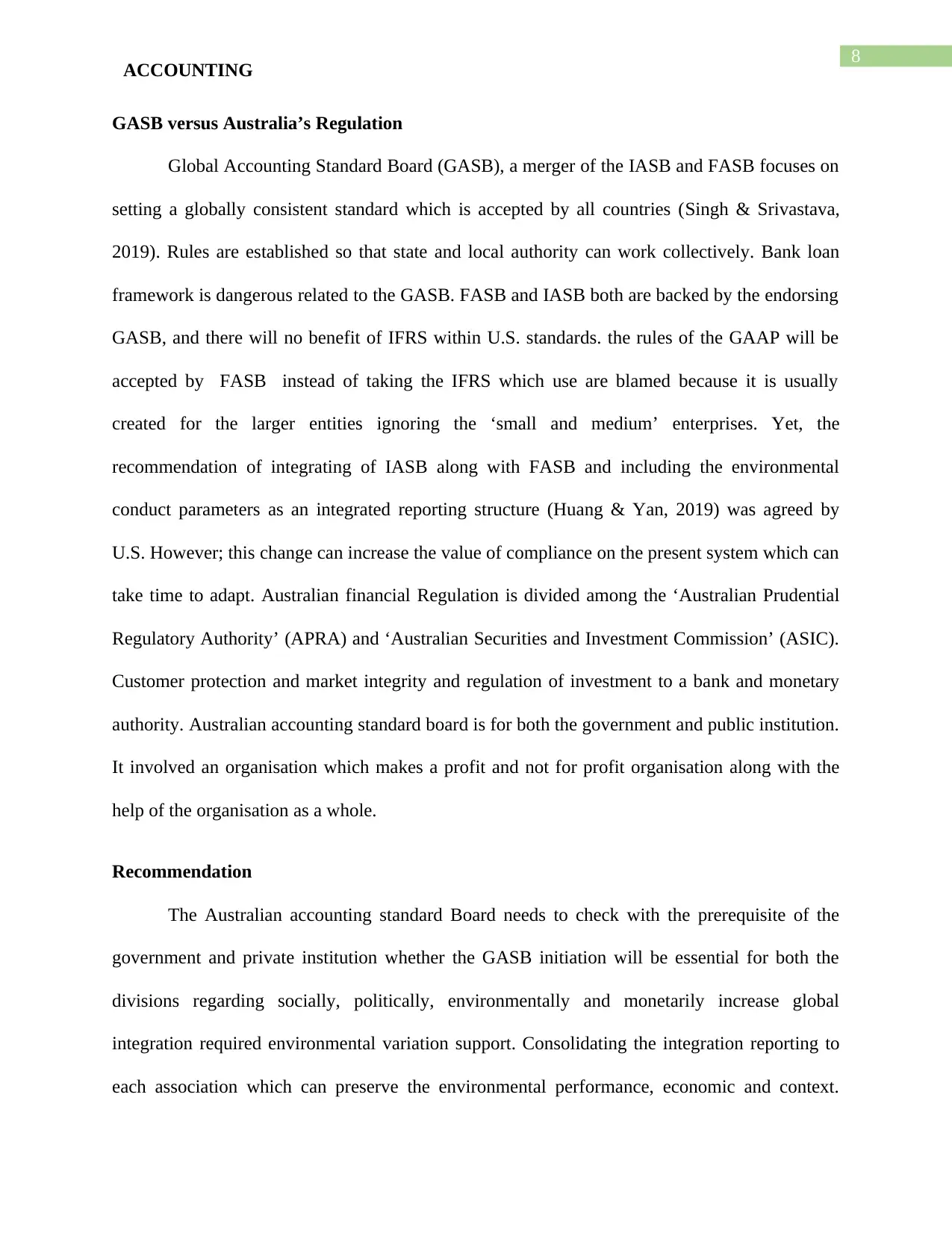
8
ACCOUNTING
GASB versus Australia’s Regulation
Global Accounting Standard Board (GASB), a merger of the IASB and FASB focuses on
setting a globally consistent standard which is accepted by all countries (Singh & Srivastava,
2019). Rules are established so that state and local authority can work collectively. Bank loan
framework is dangerous related to the GASB. FASB and IASB both are backed by the endorsing
GASB, and there will no benefit of IFRS within U.S. standards. the rules of the GAAP will be
accepted by FASB instead of taking the IFRS which use are blamed because it is usually
created for the larger entities ignoring the ‘small and medium’ enterprises. Yet, the
recommendation of integrating of IASB along with FASB and including the environmental
conduct parameters as an integrated reporting structure (Huang & Yan, 2019) was agreed by
U.S. However; this change can increase the value of compliance on the present system which can
take time to adapt. Australian financial Regulation is divided among the ‘Australian Prudential
Regulatory Authority’ (APRA) and ‘Australian Securities and Investment Commission’ (ASIC).
Customer protection and market integrity and regulation of investment to a bank and monetary
authority. Australian accounting standard board is for both the government and public institution.
It involved an organisation which makes a profit and not for profit organisation along with the
help of the organisation as a whole.
Recommendation
The Australian accounting standard Board needs to check with the prerequisite of the
government and private institution whether the GASB initiation will be essential for both the
divisions regarding socially, politically, environmentally and monetarily increase global
integration required environmental variation support. Consolidating the integration reporting to
each association which can preserve the environmental performance, economic and context.
ACCOUNTING
GASB versus Australia’s Regulation
Global Accounting Standard Board (GASB), a merger of the IASB and FASB focuses on
setting a globally consistent standard which is accepted by all countries (Singh & Srivastava,
2019). Rules are established so that state and local authority can work collectively. Bank loan
framework is dangerous related to the GASB. FASB and IASB both are backed by the endorsing
GASB, and there will no benefit of IFRS within U.S. standards. the rules of the GAAP will be
accepted by FASB instead of taking the IFRS which use are blamed because it is usually
created for the larger entities ignoring the ‘small and medium’ enterprises. Yet, the
recommendation of integrating of IASB along with FASB and including the environmental
conduct parameters as an integrated reporting structure (Huang & Yan, 2019) was agreed by
U.S. However; this change can increase the value of compliance on the present system which can
take time to adapt. Australian financial Regulation is divided among the ‘Australian Prudential
Regulatory Authority’ (APRA) and ‘Australian Securities and Investment Commission’ (ASIC).
Customer protection and market integrity and regulation of investment to a bank and monetary
authority. Australian accounting standard board is for both the government and public institution.
It involved an organisation which makes a profit and not for profit organisation along with the
help of the organisation as a whole.
Recommendation
The Australian accounting standard Board needs to check with the prerequisite of the
government and private institution whether the GASB initiation will be essential for both the
divisions regarding socially, politically, environmentally and monetarily increase global
integration required environmental variation support. Consolidating the integration reporting to
each association which can preserve the environmental performance, economic and context.
⊘ This is a preview!⊘
Do you want full access?
Subscribe today to unlock all pages.

Trusted by 1+ million students worldwide
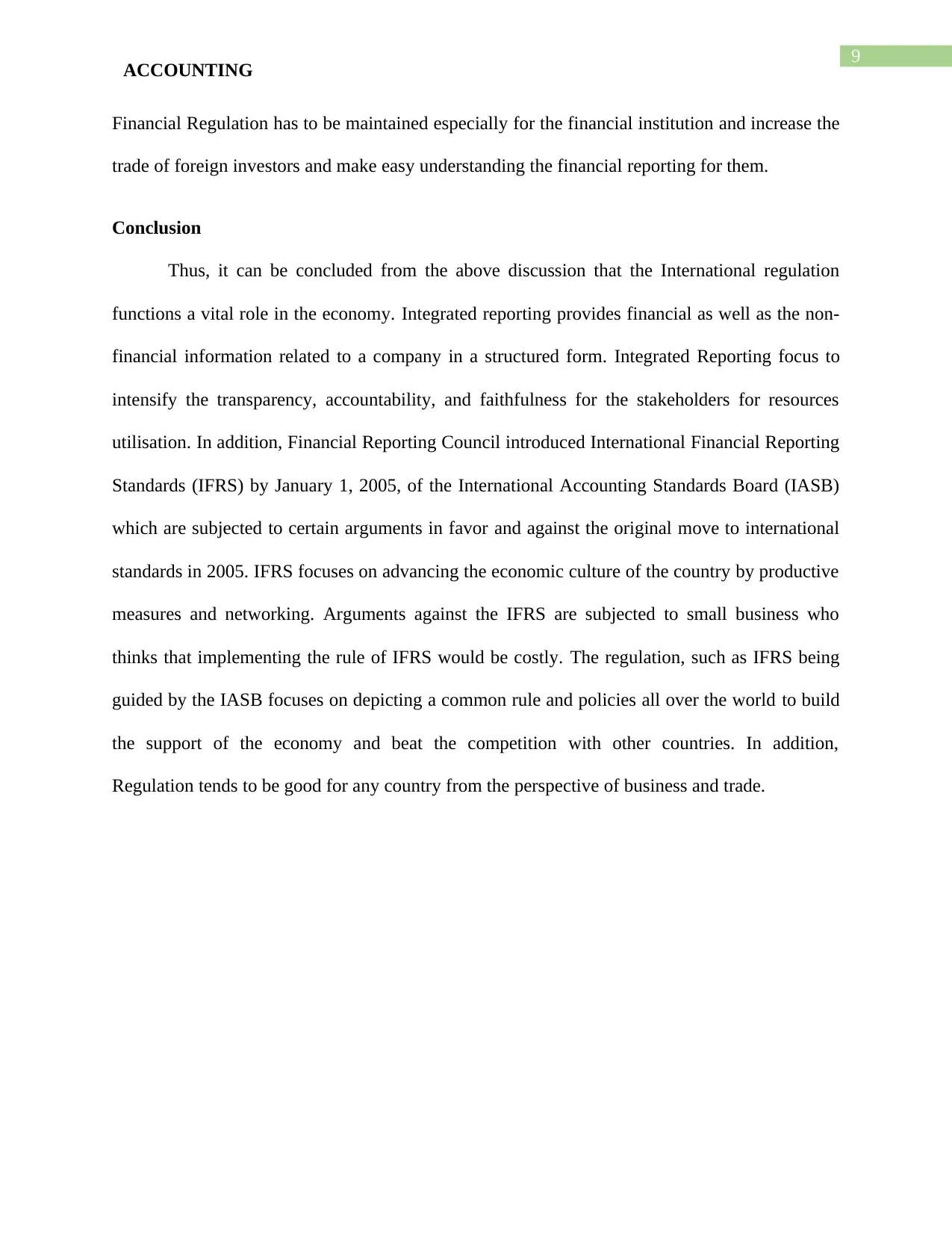
9
ACCOUNTING
Financial Regulation has to be maintained especially for the financial institution and increase the
trade of foreign investors and make easy understanding the financial reporting for them.
Conclusion
Thus, it can be concluded from the above discussion that the International regulation
functions a vital role in the economy. Integrated reporting provides financial as well as the non-
financial information related to a company in a structured form. Integrated Reporting focus to
intensify the transparency, accountability, and faithfulness for the stakeholders for resources
utilisation. In addition, Financial Reporting Council introduced International Financial Reporting
Standards (IFRS) by January 1, 2005, of the International Accounting Standards Board (IASB)
which are subjected to certain arguments in favor and against the original move to international
standards in 2005. IFRS focuses on advancing the economic culture of the country by productive
measures and networking. Arguments against the IFRS are subjected to small business who
thinks that implementing the rule of IFRS would be costly. The regulation, such as IFRS being
guided by the IASB focuses on depicting a common rule and policies all over the world to build
the support of the economy and beat the competition with other countries. In addition,
Regulation tends to be good for any country from the perspective of business and trade.
ACCOUNTING
Financial Regulation has to be maintained especially for the financial institution and increase the
trade of foreign investors and make easy understanding the financial reporting for them.
Conclusion
Thus, it can be concluded from the above discussion that the International regulation
functions a vital role in the economy. Integrated reporting provides financial as well as the non-
financial information related to a company in a structured form. Integrated Reporting focus to
intensify the transparency, accountability, and faithfulness for the stakeholders for resources
utilisation. In addition, Financial Reporting Council introduced International Financial Reporting
Standards (IFRS) by January 1, 2005, of the International Accounting Standards Board (IASB)
which are subjected to certain arguments in favor and against the original move to international
standards in 2005. IFRS focuses on advancing the economic culture of the country by productive
measures and networking. Arguments against the IFRS are subjected to small business who
thinks that implementing the rule of IFRS would be costly. The regulation, such as IFRS being
guided by the IASB focuses on depicting a common rule and policies all over the world to build
the support of the economy and beat the competition with other countries. In addition,
Regulation tends to be good for any country from the perspective of business and trade.
Paraphrase This Document
Need a fresh take? Get an instant paraphrase of this document with our AI Paraphraser
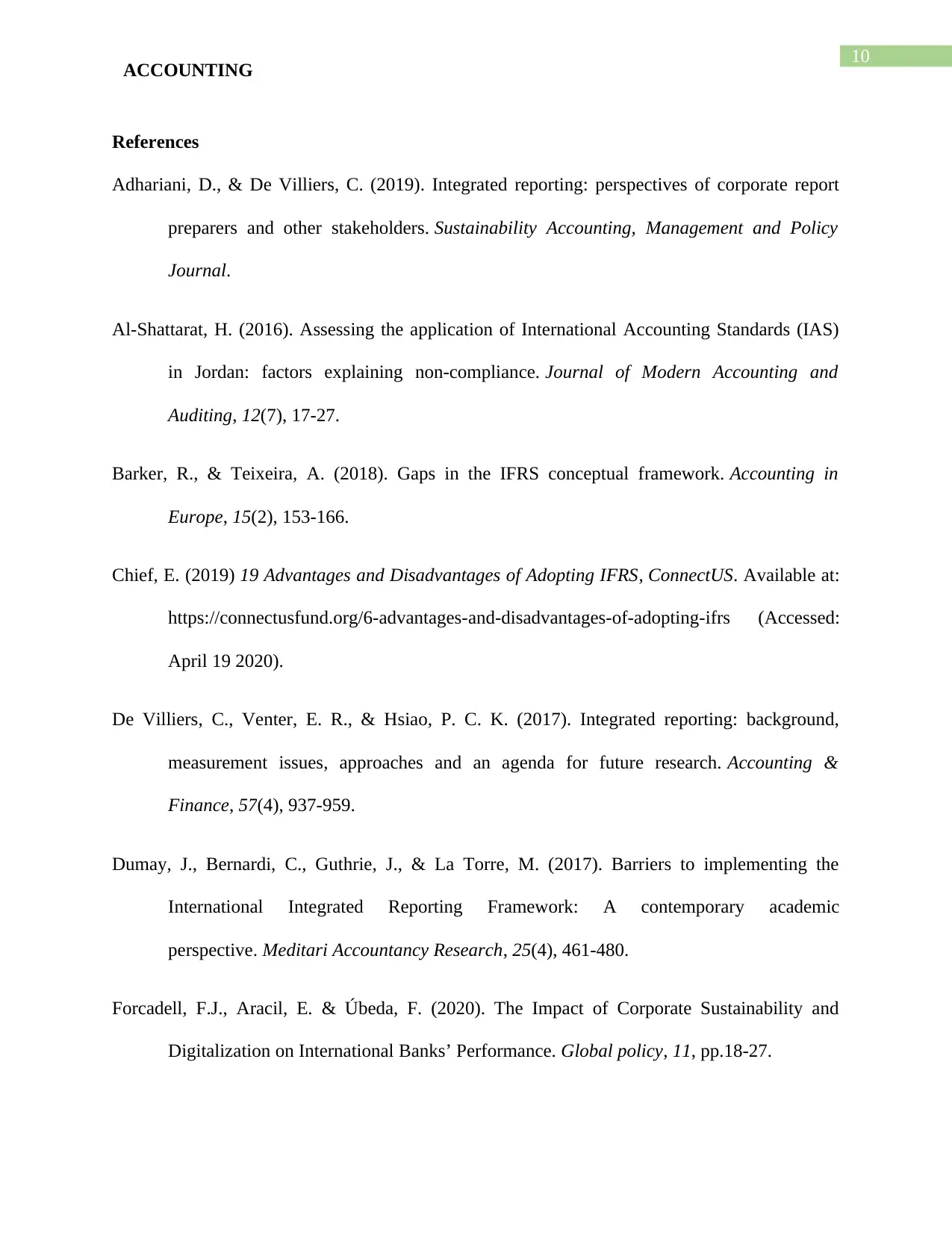
10
ACCOUNTING
References
Adhariani, D., & De Villiers, C. (2019). Integrated reporting: perspectives of corporate report
preparers and other stakeholders. Sustainability Accounting, Management and Policy
Journal.
Al-Shattarat, H. (2016). Assessing the application of International Accounting Standards (IAS)
in Jordan: factors explaining non-compliance. Journal of Modern Accounting and
Auditing, 12(7), 17-27.
Barker, R., & Teixeira, A. (2018). Gaps in the IFRS conceptual framework. Accounting in
Europe, 15(2), 153-166.
Chief, E. (2019) 19 Advantages and Disadvantages of Adopting IFRS, ConnectUS. Available at:
https://connectusfund.org/6-advantages-and-disadvantages-of-adopting-ifrs (Accessed:
April 19 2020).
De Villiers, C., Venter, E. R., & Hsiao, P. C. K. (2017). Integrated reporting: background,
measurement issues, approaches and an agenda for future research. Accounting &
Finance, 57(4), 937-959.
Dumay, J., Bernardi, C., Guthrie, J., & La Torre, M. (2017). Barriers to implementing the
International Integrated Reporting Framework: A contemporary academic
perspective. Meditari Accountancy Research, 25(4), 461-480.
Forcadell, F.J., Aracil, E. & Úbeda, F. (2020). The Impact of Corporate Sustainability and
Digitalization on International Banks’ Performance. Global policy, 11, pp.18-27.
ACCOUNTING
References
Adhariani, D., & De Villiers, C. (2019). Integrated reporting: perspectives of corporate report
preparers and other stakeholders. Sustainability Accounting, Management and Policy
Journal.
Al-Shattarat, H. (2016). Assessing the application of International Accounting Standards (IAS)
in Jordan: factors explaining non-compliance. Journal of Modern Accounting and
Auditing, 12(7), 17-27.
Barker, R., & Teixeira, A. (2018). Gaps in the IFRS conceptual framework. Accounting in
Europe, 15(2), 153-166.
Chief, E. (2019) 19 Advantages and Disadvantages of Adopting IFRS, ConnectUS. Available at:
https://connectusfund.org/6-advantages-and-disadvantages-of-adopting-ifrs (Accessed:
April 19 2020).
De Villiers, C., Venter, E. R., & Hsiao, P. C. K. (2017). Integrated reporting: background,
measurement issues, approaches and an agenda for future research. Accounting &
Finance, 57(4), 937-959.
Dumay, J., Bernardi, C., Guthrie, J., & La Torre, M. (2017). Barriers to implementing the
International Integrated Reporting Framework: A contemporary academic
perspective. Meditari Accountancy Research, 25(4), 461-480.
Forcadell, F.J., Aracil, E. & Úbeda, F. (2020). The Impact of Corporate Sustainability and
Digitalization on International Banks’ Performance. Global policy, 11, pp.18-27.
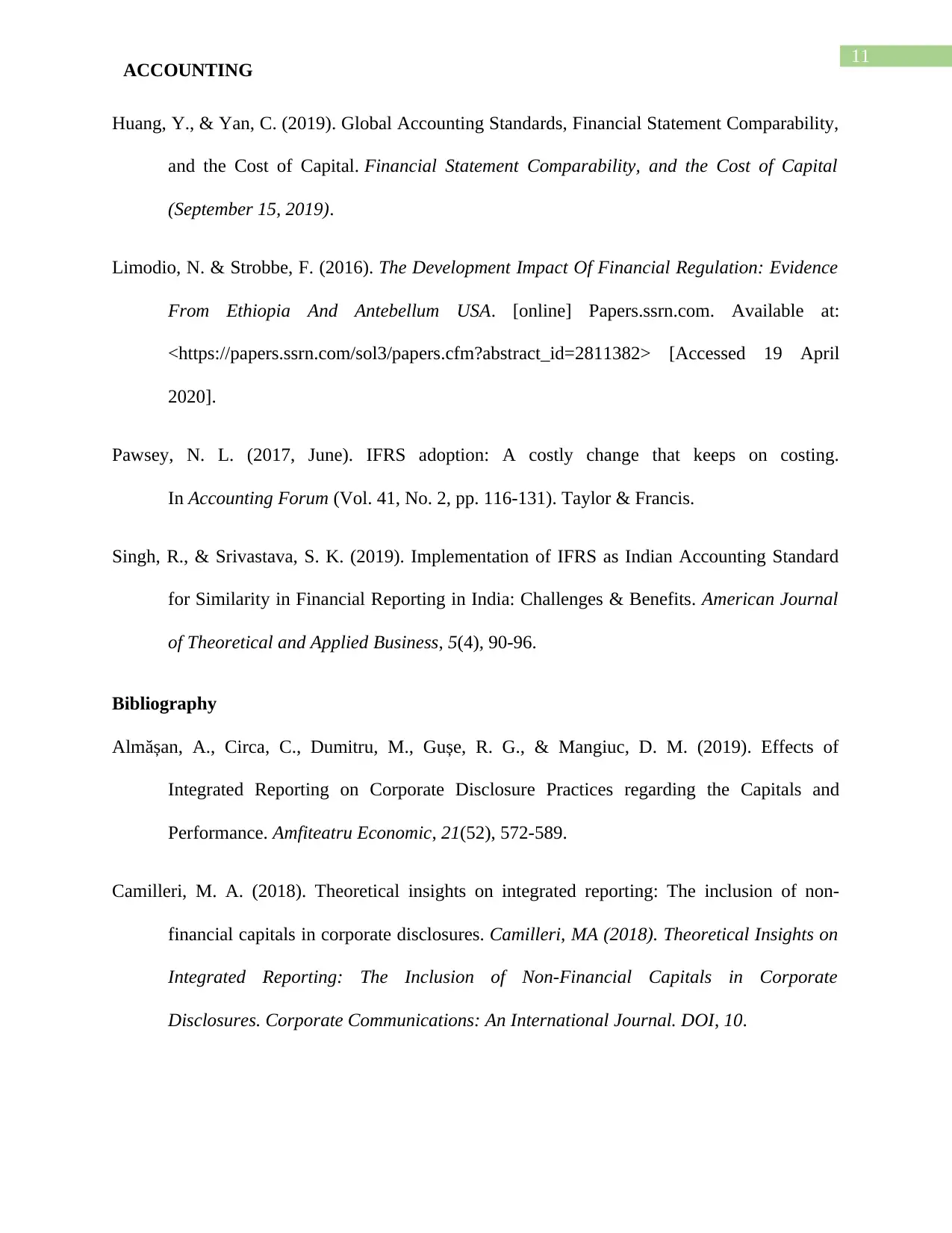
11
ACCOUNTING
Huang, Y., & Yan, C. (2019). Global Accounting Standards, Financial Statement Comparability,
and the Cost of Capital. Financial Statement Comparability, and the Cost of Capital
(September 15, 2019).
Limodio, N. & Strobbe, F. (2016). The Development Impact Of Financial Regulation: Evidence
From Ethiopia And Antebellum USA. [online] Papers.ssrn.com. Available at:
<https://papers.ssrn.com/sol3/papers.cfm?abstract_id=2811382> [Accessed 19 April
2020].
Pawsey, N. L. (2017, June). IFRS adoption: A costly change that keeps on costing.
In Accounting Forum (Vol. 41, No. 2, pp. 116-131). Taylor & Francis.
Singh, R., & Srivastava, S. K. (2019). Implementation of IFRS as Indian Accounting Standard
for Similarity in Financial Reporting in India: Challenges & Benefits. American Journal
of Theoretical and Applied Business, 5(4), 90-96.
Bibliography
Almășan, A., Circa, C., Dumitru, M., Gușe, R. G., & Mangiuc, D. M. (2019). Effects of
Integrated Reporting on Corporate Disclosure Practices regarding the Capitals and
Performance. Amfiteatru Economic, 21(52), 572-589.
Camilleri, M. A. (2018). Theoretical insights on integrated reporting: The inclusion of non-
financial capitals in corporate disclosures. Camilleri, MA (2018). Theoretical Insights on
Integrated Reporting: The Inclusion of Non-Financial Capitals in Corporate
Disclosures. Corporate Communications: An International Journal. DOI, 10.
ACCOUNTING
Huang, Y., & Yan, C. (2019). Global Accounting Standards, Financial Statement Comparability,
and the Cost of Capital. Financial Statement Comparability, and the Cost of Capital
(September 15, 2019).
Limodio, N. & Strobbe, F. (2016). The Development Impact Of Financial Regulation: Evidence
From Ethiopia And Antebellum USA. [online] Papers.ssrn.com. Available at:
<https://papers.ssrn.com/sol3/papers.cfm?abstract_id=2811382> [Accessed 19 April
2020].
Pawsey, N. L. (2017, June). IFRS adoption: A costly change that keeps on costing.
In Accounting Forum (Vol. 41, No. 2, pp. 116-131). Taylor & Francis.
Singh, R., & Srivastava, S. K. (2019). Implementation of IFRS as Indian Accounting Standard
for Similarity in Financial Reporting in India: Challenges & Benefits. American Journal
of Theoretical and Applied Business, 5(4), 90-96.
Bibliography
Almășan, A., Circa, C., Dumitru, M., Gușe, R. G., & Mangiuc, D. M. (2019). Effects of
Integrated Reporting on Corporate Disclosure Practices regarding the Capitals and
Performance. Amfiteatru Economic, 21(52), 572-589.
Camilleri, M. A. (2018). Theoretical insights on integrated reporting: The inclusion of non-
financial capitals in corporate disclosures. Camilleri, MA (2018). Theoretical Insights on
Integrated Reporting: The Inclusion of Non-Financial Capitals in Corporate
Disclosures. Corporate Communications: An International Journal. DOI, 10.
⊘ This is a preview!⊘
Do you want full access?
Subscribe today to unlock all pages.

Trusted by 1+ million students worldwide
1 out of 13
Related Documents
Your All-in-One AI-Powered Toolkit for Academic Success.
+13062052269
info@desklib.com
Available 24*7 on WhatsApp / Email
![[object Object]](/_next/static/media/star-bottom.7253800d.svg)
Unlock your academic potential
Copyright © 2020–2026 A2Z Services. All Rights Reserved. Developed and managed by ZUCOL.





